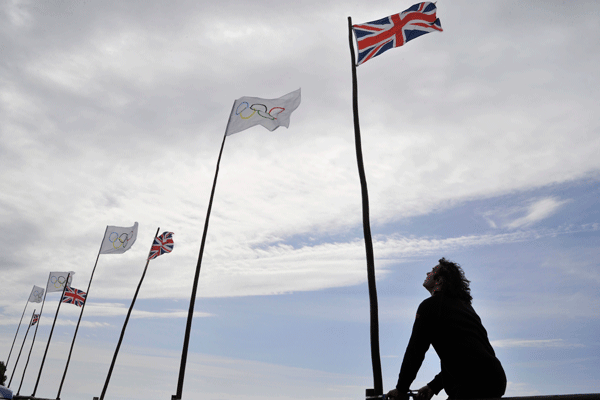
WASHINGTON (CNS) — More than three dozen U.S. and British faith-based investment firms have banded together to get the Summer Olympics’ major sponsors and tourist hotels to sign a pledge saying they will work to stop human trafficking around the Olympic Games.
So far, the campaign has had some success.
“The issue has taken hold and the hotels are doing training, and their staff is aware that there are issues that require the attention of management or police agencies and social services,” said Julie Tanner, assistant director of socially responsible investing for Christian Brothers Investment Services.
The work builds on efforts to combat human trafficking — sex trafficking, forced labor and child labor among them — at the 2010 World Cup in South Africa and this year’s Super Bowl in Indianapolis.
One new wrinkle is that the 37 faith-based investment firms have not only approached hotels but also the major sponsors of the summer games.
Thirteen hotels and 19 sponsors were chosen. The Olympics has far more than 19 sponsors, but this particular group of 19 was picked because it was “where we felt the companies had risks from trafficking,” Tanner told Catholic News Service in a May 16 telephone interview from New York.
“We get into some of the consumer brands,” Tanner said, many of which have “huge supply chains in terms of their products. … All of these things that make up their products require them to have a number of factories, a number of suppliers.”
“While those companies, on the face of it, may not be apparent” in trafficking, according to Tanner, it is worth prodding companies, he said, to ask themselves, “Are you monitoring your factories? Are you auditing? Are you making sure there’s no forced labor, no slave labor, no child labor?”
One of the problems for the anti-trafficking campaign is “the lack of statistics and information and research,” Tanner said, adding that part of the reason is “it’s very difficult to count.” For example, a minor may be arrested on a prostitution charge, she added, but police do not label it as sex trafficking.
Carol Smolenski, executive director of ECPAT-USA, which works to eliminate child sex trafficking, agreed with Tanner. Precise numbers are hard to come by, she said, even in an age of increased awareness of the problem.
“It’s difficult to say we’ve reduced trafficking by 80 percent because we didn’t know what the numbers were to begin with,” she told CNS May 16 from ECPAT-USA headquarters in New York City. ECPAT, based in Thailand, is an acronym for End Child Prostitution and Trafficking.
The most reliable U.S. numbers, according to Smolenski, are from a decade-old study from the University of Pennsylvania, which estimated that 200,000-300,000 children were being used for sex trafficking. “Since then there has not been a study that has attempted to count them,” she added.
Abby Kuzma from the state of Indiana’s attorney general office, said arrests were made in conjunction with child trafficking at the Super Bowl, Four victims were identified. Two of those were “sent home right away,” Kuzma said in a telephone message left with CNS, while the other two were held pending further investigation.
Firms queried about their practices for the Olympics have given “a very good rate of return” in responding, Tanner told CNS, but what is revealing is the substance of their answers. “The companies are providing very substantive and thorough information. Some were less detailed, but overall it was interesting. There is significant awareness of the issue by companies. One of the things we’re going to do next month (June) is do an analysis of the responses.”
In addition to releasing the analysis, another thing the faith-based investment agencies will do at the end of June is reveal which companies and hotels gave their queries the cold shoulder.
— By Mark Pattison, Catholic News Service





